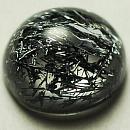|
Click on a letter above to view the list of gems. |
|
|
|
|
|
|
|
|
Jamesonite
(inclusions
in Quartz) |
|
| | |
| Discovered in 1825. IMA status: Valid (pre-IMA; Grandfathered) | ||
|
| ||
|
Chemistry |
|
|
| |
|
Pb4Fe2+Sb6S14 | |
|
|
Lead Iron Antimony Sulfide |
|
Molecular Weight: |
2,064.07 gm |
|
Composition: |
Iron |
2.71 % |
Fe |
|
|
|
|
Antimony |
35.39 % |
Sb |
|
|
|
|
Lead |
40.15 % |
Pb |
|
|
|
|
Sulfur |
21.75 % |
O |
|
|
|
|
|
100.00 % |
|
|
|
|
|
|
||||
|
Classification |
|
|
| |
|
Sulfides | |
|
2/E.22-10 | |
|
|
2 : SULFIDES and SULFOSALTS (sulfides, selenides,
tellurides; arsenides, antimonides, bismuthides; sulfarsenites,
sulfantimonites, sulfbismuthites, etc.) |
|
Related to: |
Benavidesite-Jamesonite Series. Dimorphous with Parajamesonite. |
|
Synonyms: |
Axotomous Antimony Glance, Comuccite, Cornuccite, Domingite, Jamesonite (of Haidinger), Pfaffite (of Huot), Sakharovaite, Tinder Ore, Warrenite (of Eakins), Wolfsbergite (of Huot) |
|
|
|
|
Crystal Data |
|
|
|
|
|
Crystals elongated || [001], acicular and fibrous, to 10 cm; striated k [001]; rarely in rings and spheres. As feltlike masses; massive, columnar, also radial and plumose. |
|
|
On {100}; lamellae very commonly observed in polished section. |
|
|
|
|
|
Physical Properties |
|
|
|
|
|
Good on {001}; reported on {010} and {120} |
|
|
n/a |
|
|
Brittle |
|
|
2.5; VHN = 66–86 (100 g load) |
|
|
5.63 (g/cm3) |
|
|
None |
|
|
Not Radioactive |
|
|
|
|
|
Optical Properties |
|
|
|
|
|
Gray-Black, lead Gray, Steel Gray, dark lead Gray; iridescent at times |
|
|
Opaque |
|
|
Metallic |
|
|
R1–R2: (400) 38.4–45.1, (420) 38.1–44.9, (440) 37.7–44.8, (460) 37.6–45.0, (480) 37.4–45.1, (500) 37.3–45.0, (520) 37.0–44.7, (540) 36.6–44.3, (560) 36.1–43.8, (580) 35.7–43.2, (600) 35.3–42.6, (620) 34.8–41.9, (640) 34.2–41.0, (660) 33.6–40.1, (680) 33.0–39.2, (700) 32.5–38.5 |
|
|
Distinct |
|
|
Strong; Color in reflected light: Gray-Black |
|
|
|
|
|
Occurances |
|
|
|
|
|
Geological Setting: |
Typically a late-stage hydrothermal mineral in Pb–Ag–Zn veins formed at low to medium temperatures. |
|
Common Associations: |
Other lead Sulfosalts, Pyrite, Sphalerite, Galena, Tetrahedrite, Stibnite, Quartz, Siderite, Calcite, Dolomite, Rhodochrosite. |
|
Common Impurities: |
Cu, Zn, Ag, Bi |
|
Type Locality: |
Cornwall, England, UK |
|
Year Discovered: |
1825 |
|
View mineral photos: | |
|
|
|
|
More Information |
|
|
|
|
|
| |
|
|
|
|
Jamesonite
is available from numerous localities, but only a few
have provided rich material. From Cornwall, England,
around St. Endellion [TL] and St. Kew. In Germany, at
Freiberg, Saxony; and near Magdesprung, Selke Valley,
and Clausthal, Harz Mountains. From Príbram, Czech Republic.
At Aranyidka, Baia Sprie (Felsöbánya), and Herja (Kisbánya),
Baia Mare (Nagybánya) district, Romania. From Trepca,
Serbia. At Sala, Västmanland, Sweden. From Machacamarca,
Poopó, and Huanuni, Oruro, Bolivia. In Mexico, from
the Noche Buena mine, near Mazapil; the Santa Rita mine,
Nieves; and in relatively thick crystals from the Noria
mine, near Sombrerete, Zacatecas. In the USA, in Idaho,
at Slate Creek, Shoshone County From the Dachang district,
Guangxi Autonomous Region, China. |
|
|
We
have not photographed our Jamesonite gems. Please
check back soon. |

